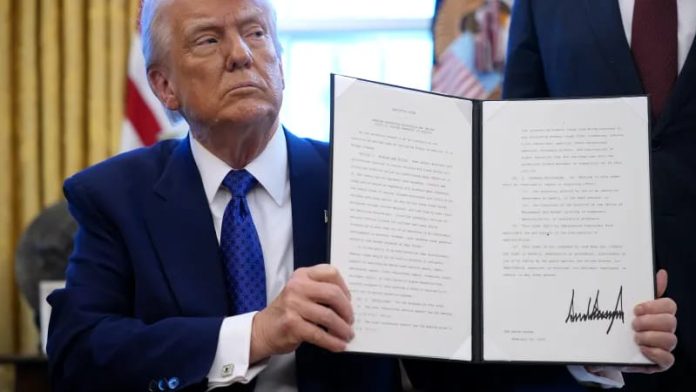In a significant shift toward modernization, President Donald Trump has signed an executive order directing the federal government to phase out the use of paper checks by September 30, 2025, with certain exceptions. The order aims to enhance the efficiency of payment systems, reduce costs, and minimize security risks associated with paper-based transactions.
The White House’s announcement emphasizes the growing concerns surrounding paper checks, including the rising incidence of fraud and theft. The FBI has reported a near doubling of check fraud cases since 2021, largely attributed to increased mail theft. In 2024, the Federal Trade Commission documented around 8,000 instances of check fraud, resulting in losses of approximately $2.25 million. Despite the notable figures, electronic payment fraud remains a larger concern in terms of both case numbers and financial impact.
The executive order mandates that all federal payments—including benefits, vendor payments, and tax refunds—transition to electronic forms, such as direct deposits, credit or debit card payments, and digital wallets. The administration also intends for the Treasury Department to eliminate physical lockboxes and reduce the costs associated with processing paper receipts, which amounted to over $657 million in fiscal year 2024.
While the push for electronic payments is anticipated to save taxpayer money and enhance fraud protection, challenges remain. Many U.S. businesses still rely heavily on paper checks, with a third of all payments between businesses in the U.S. and Canada made by check as of 2022. This transition may prove difficult for those who lack access to electronic payment systems, as well as those who prefer traditional methods.
To address these concerns, the administration plans to launch a public awareness campaign aimed at educating federal benefit recipients about the changes and assisting them in setting up electronic payment methods. Financial institutions and corporations will also need to adapt quickly to the new payment landscape, as the deadline approaches.
Industry experts, such as Peter Tapling from PTap Advisory, acknowledge the potential benefits of moving away from paper checks, including improved tracking, reduced costs, and enhanced security. However, the transition is likely to face resistance from various stakeholders who may struggle with the shift.
As the federal government embarks on this ambitious initiative, it underscores a growing trend toward digital payments, reflecting a broader movement in the financial landscape. The implications of this change will resonate throughout the business community and beyond.
For further updates on this and other important financial news, stay tuned to Newspot Nigeria.
Share your story or advertise with us: Whatsapp: +2347068606071 Email: info@newspotng.com

















